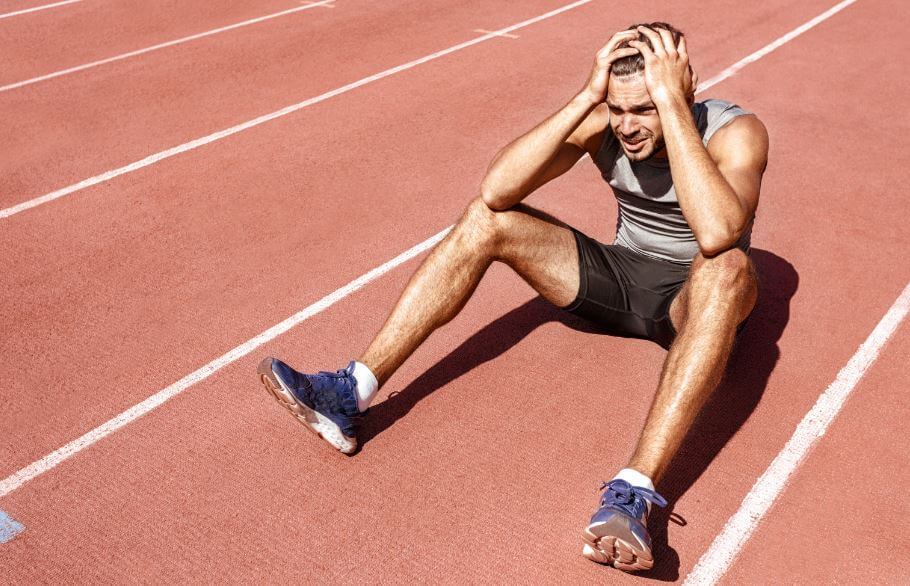Depression and Sports

There’s an association between sports and depression. Most people believe that physical exercise reduces mental discomfort. However, how true is that statement? In order to find out, let’s investigate the chemical, organic and psychological impact that sports have on people. Particularly in people with an increased risk of suffering from depression.
Now, can the relationship between sports and depression be inverse? For example, many professional athletes are exposed to depression, their working conditions are one of the factors that may influence the relationship.
What’s depression?
Nowadays, the word depression is used often and sometimes erroneously. Being depressed is more than simply feeling sad. Therefore, it’s important to make the distinction.
The World Health Organization defines depression as a mood disorder disease, influenced by both psychological and organic factors.
Main symptoms
In general terms, depression is a diagnosis that includes a varied set of symptoms. The disorder can occur in a severe or mild way and it can be temporary or permanent. The following are the main signs of depression:
- Emotional exhaustion: excessive stress, isolation, feeling unwell, irritability and constant sadness. Some people also experience anxiety.
- Nervous system changes: depression is associated with functional and structural alterations of the central nervous system. It’s mainly linked with deficiencies or irregularities in the production of neurotransmitters; dopamine and serotonin.
- Cognitive impairment: people who are depressed tend to have reduced cognitive performance in complex functions that involve memory and attention.
Beyond these symptoms, it’s important to note that depression is a complex issue that may be influenced by genetic, biological and psycho-social factors.

Depression and sports
As we previously mentioned, according to popular opinion, sports are the cure for depression. This statement is misleading since it sells an easy cure for a complex disease. The truth is that sports are one of the many tools that could be used to combat and prevent depressive states. However, it’s not a miraculous or instant remedy.
How do sports help prevent depression?
Sports can be a tool to prevent depression because of the following factors:
- Increased production of endorphins: this neurotransmitter is released by the hypothalamus and it creates a soothing effect. Sports can increase the production of endorphins.
- Improved self-esteem: sports have an impact on physical well-being. Improvements in appearance can help boost self-esteem.
- Social bonds: as we previously mentioned, isolation and social disinterest are factors that can be reduced with group sports. While playing team sports, people become more encouraged and motivated to do more outdoor activities.
- Motivation: sports can put yourself to the test. The realization of short goals and objectives can increase motivation.
Will any sport do?
On a psychological level, depression is a disorder with many causes. Therefore playing sports alone is not enough. Sports can be beneficial if they meet the following criteria:
- Diversified sports: your routines should not be monotonous, if they are, they’ll be seen simply as a passing distraction. The sport should be fun and it must be diverse. This will allow the practitioner to use their cognitive and motor faculties.
- Controlled expectations: it’s important to keep in mind that sports alone will not cure depression.
Sports and depression: the other side of the coin
Just as sports can be a tool to fight depression, in a certain group of individuals, sports can also cause depression. This applies more to professional athletes who dedicate their lives to sports.
Causes of depression in sports
As with other scenarios, sports can cause depression when it’s linked to other factors. The following are the most common factors:
- Burnout: this syndrome is characterized by exhaustion and isolation and it can often lead to depression. When athletes stop enjoying their activities and feel as though the rewards are not worth the sacrifice and effort, they are more likely to experience depression.

- Injuries: many athletes believe that the key to recovery from an injury is the mind. Why? Because anxiety can cause athletes to fall into a dark hole. In addition, concussions that occur in contact sports can lead to progressive cognitive decline and depressive symptoms.
- Retirement: retirement can be a difficult stage for any athlete. In these cases, the most likely to suffer from depression are athletes who haven’t prepared for retirement adequately.
Conclusion: depression and sports
In conclusion, it’s important to note the key role that sports play as a tool to fight the organic and psychological risks of depression. However, it’s also important to keep in mind that educational and formative activities are also important when it comes to athletes.
Depression is a serious disease that’s linked to many different factors. That’s why it’s always important to consult a health professional.
There’s an association between sports and depression. Most people believe that physical exercise reduces mental discomfort. However, how true is that statement? In order to find out, let’s investigate the chemical, organic and psychological impact that sports have on people. Particularly in people with an increased risk of suffering from depression.
Now, can the relationship between sports and depression be inverse? For example, many professional athletes are exposed to depression, their working conditions are one of the factors that may influence the relationship.
What’s depression?
Nowadays, the word depression is used often and sometimes erroneously. Being depressed is more than simply feeling sad. Therefore, it’s important to make the distinction.
The World Health Organization defines depression as a mood disorder disease, influenced by both psychological and organic factors.
Main symptoms
In general terms, depression is a diagnosis that includes a varied set of symptoms. The disorder can occur in a severe or mild way and it can be temporary or permanent. The following are the main signs of depression:
- Emotional exhaustion: excessive stress, isolation, feeling unwell, irritability and constant sadness. Some people also experience anxiety.
- Nervous system changes: depression is associated with functional and structural alterations of the central nervous system. It’s mainly linked with deficiencies or irregularities in the production of neurotransmitters; dopamine and serotonin.
- Cognitive impairment: people who are depressed tend to have reduced cognitive performance in complex functions that involve memory and attention.
Beyond these symptoms, it’s important to note that depression is a complex issue that may be influenced by genetic, biological and psycho-social factors.

Depression and sports
As we previously mentioned, according to popular opinion, sports are the cure for depression. This statement is misleading since it sells an easy cure for a complex disease. The truth is that sports are one of the many tools that could be used to combat and prevent depressive states. However, it’s not a miraculous or instant remedy.
How do sports help prevent depression?
Sports can be a tool to prevent depression because of the following factors:
- Increased production of endorphins: this neurotransmitter is released by the hypothalamus and it creates a soothing effect. Sports can increase the production of endorphins.
- Improved self-esteem: sports have an impact on physical well-being. Improvements in appearance can help boost self-esteem.
- Social bonds: as we previously mentioned, isolation and social disinterest are factors that can be reduced with group sports. While playing team sports, people become more encouraged and motivated to do more outdoor activities.
- Motivation: sports can put yourself to the test. The realization of short goals and objectives can increase motivation.
Will any sport do?
On a psychological level, depression is a disorder with many causes. Therefore playing sports alone is not enough. Sports can be beneficial if they meet the following criteria:
- Diversified sports: your routines should not be monotonous, if they are, they’ll be seen simply as a passing distraction. The sport should be fun and it must be diverse. This will allow the practitioner to use their cognitive and motor faculties.
- Controlled expectations: it’s important to keep in mind that sports alone will not cure depression.
Sports and depression: the other side of the coin
Just as sports can be a tool to fight depression, in a certain group of individuals, sports can also cause depression. This applies more to professional athletes who dedicate their lives to sports.
Causes of depression in sports
As with other scenarios, sports can cause depression when it’s linked to other factors. The following are the most common factors:
- Burnout: this syndrome is characterized by exhaustion and isolation and it can often lead to depression. When athletes stop enjoying their activities and feel as though the rewards are not worth the sacrifice and effort, they are more likely to experience depression.

- Injuries: many athletes believe that the key to recovery from an injury is the mind. Why? Because anxiety can cause athletes to fall into a dark hole. In addition, concussions that occur in contact sports can lead to progressive cognitive decline and depressive symptoms.
- Retirement: retirement can be a difficult stage for any athlete. In these cases, the most likely to suffer from depression are athletes who haven’t prepared for retirement adequately.
Conclusion: depression and sports
In conclusion, it’s important to note the key role that sports play as a tool to fight the organic and psychological risks of depression. However, it’s also important to keep in mind that educational and formative activities are also important when it comes to athletes.
Depression is a serious disease that’s linked to many different factors. That’s why it’s always important to consult a health professional.
All cited sources were thoroughly reviewed by our team to ensure their quality, reliability, currency, and validity. The bibliography of this article was considered reliable and of academic or scientific accuracy.
- Amorosi, M. (2014). Correlation between sport and depression. Psychiatria Danubina, 26, 208-210. Recuperado de Scopus.
- Nixdorf, I., Frank, R., & Beckmann, J. (2016). Comparison of athletes’ proneness to depressive symptoms in individual and team sports: Research on psychological mediators in junior elite athletes. Frontiers in Psychology, 7(JUN). https://doi.org/10.3389/fpsyg.2016.00893
- Yrondi, A., Brauge, D., LeMen, J., Arbus, C., & Pariente, J. (2017). Depression and sports-related concussion: A systematic review. Presse Medicale, 46(10), 890-902. https://doi.org/10.1016/j.lpm.2017.08.013
This text is provided for informational purposes only and does not replace consultation with a professional. If in doubt, consult your specialist.








